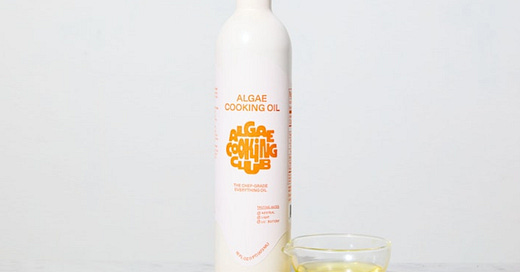What is the most unhealthy ingredient in the food supply? According to Robert F. Kennedy Jr., the answer is seed oils. The Health and Human Services Secretary has declared war on canola, corn, grapeseed, sunflower, safflower, and soybean (a.k.a vegetable) oils, claiming that Americans are being “unknowingly poisoned” by the long-time kitchen staple.
Nutrition experts almost uniformly disagree. Regardless, the furious debate has given quite a boost to a new breed of cooking oils: ones made via fermentation, from brands like Algae Cooking Club (ACC) and Zero Acre.
These oils have been on my radar for a while. Both brands make sweeping claims about sustainability. But at $23 and $27 a bottle, respectively, they’re quite an investment compared to the products they’re intended to replace; today, despite several years of rising prices, a 40-ounce bottle of canola oil can still be had for just over $4.
So what are these new, high-tech oils? Are their sustainability claims legit? And should you give them a try?
Wait, you can make oil from … algae?
Apparently, yes! Though each company has its own proprietary process, both Algae Cooking Club and Zero Acre use algae to ferment sugarcane into a clean, healthy fat. In ACC’s case, here’s how it works.
A microorganism called prototheca moriformis is dumped in a stainless-steel fermentation vessel — the kind of thing you might see on a brewery tour. It is then fed with sugarcane, which causes the algae to multiply and mature. Over the course of a few days, the algae plumps up, with oil ultimately accounting for 80 percent of the algae’s cell weight. A centrifuge is then used to extract the oil, which is later refined for cooking. (Still confused? The Wall Street Journal has a nice infographic of the process here.)
If the whole thing seems kind of weird, think again. Our bodies turn excess sugar into fat all the time.
In my conversations with Zero Acre, the company didn’t specify which strain of algae it uses, or who produces its oil (both Zero Acre and ACC use an outside company to do this). But both oils are made in Brazil, and it’s hard to imagine there’s more than one factory turning out such a niche product. In other words, it seems very possible that the oils are produced in the same facility, just packaged and marketed differently.
What’s so great about these oils?
Oils from Algae Cooking Club and Zero Acre are exceedingly high in monounsaturated fat with minimal amounts of saturated and polyunsaturated fat. The chart below compares their fat compositions, and smoke points, to standard canola and extra virgin olive oil.
Everyone agrees that monounsaturated fats are good fats, so Zero Acre and Algae Cooking Club look great on that front. Where there’s disagreement is on saturated and polyunsaturated fats. Some nutrition tribes (Paleo, et al.) are pro-saturated fats; others, including seed-oil skeptics, worry that the free radicals released when polyunsaturated fats break down at high heat can lead to inflammation. (Studies do not bear out this fear.)
These fermented oils also alleviate another common concern about seed oils: how they are made. Seed oils are often extracted using chemicals, which some worry exposes eaters to trace amounts of hexane, a volatile hydrocarbon found in crude oil and natural gas. Harvard School of Public Health notes that seed oils make up less than 2 percent of our day-to-day hexane exposure; the rest comes from breathing in gasoline fumes. Neither Zero Acre nor ACC use chemical solvents for extraction. (Seed oils that do not use extraction are labeled “expeller pressed.”)
Even if you’re not worried about seed oils, these oils offer practical benefits: Oils high in monounsaturated fats are more stable than those with polyunsaturated fats, and therefore less likely to go rancid. It also means that they stay liquid at room temperature. This is not the case with lard, tallow, and other highly saturated fats like coconut oil. Jeff Nobbs, the CEO of Zero Acre, describes his oil as having the “versatility of a seed oil but the stability of a beef tallow.”
What about sustainability?
Both Algae Cooking Club and Zero Acre make big claims about sustainability. ACC claims that its oil has 47 percent fewer carbon emissions than canola oil; while Zero Acre’s Sustainability Report concludes that it emits 86 percent fewer greenhouse gases, consumes 83 percent less water, and uses 90 percent less land than comparable vegetable oils.
It’s hard to verify these numbers. But the first one I looked into — water usage per pound of oil produced — raised questions about Zero Acre’s math. The company claims that olive oil needs 308 gallons of water to produce a single pound of oil — a number that is 62 percent higher than an estimate from the North American Olive Oil Association.
Keep reading with a 7-day free trial
Subscribe to Consumed to keep reading this post and get 7 days of free access to the full post archives.






